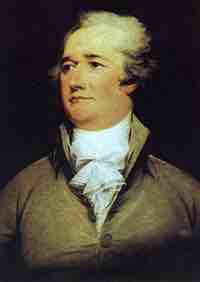Financial Difficulties of a New Nation
The United States was born mired in debt. In 1789, when Alexander Hamilton was appointed as Secretary of the Treasury, the federal debt was more than $53 million, and the states had a combined debt of around $25 million. The United States had been unable to pay its debts in the 1780s and was therefore considered a credit risk by European countries. In his new office, Hamilton wrote a series of reports offering solutions to the economic crisis brought on by these problems. The reports addressed public credit, banking, and raising revenue and encouraged the development of an elaborate system of duties, tariffs, and excises.
With the support of Washington, the entire Hamiltonian economic program received the necessary support in Congress to be implemented. In the long run, Hamilton’s financial program helped to rescue the United States from its state of near bankruptcy in the late 1780s. His initiatives marked the beginning of American capitalism, making the republic creditworthy, promoting commerce, and establishing a solid financial foundation for the nation. His policies also facilitated the growth of the stock market, as U.S. citizens bought and sold the federal government’s interest-bearing certificates.

The country's first economic policy
As Secretary of the Treasury, Alexander Hamilton would propose influential economic policies during Washington's term as President.
Advances in Manufacturing
In the 1790s, Hamilton and the Federalist Party extolled innovation in manufacturing (demonstrated by the development of the "American System") as the supreme virtues of American republicanism. The "American System" featured semi-skilled laborers using machine tools and jigs to make standardized, identical, interchangeable parts, which could be assembled quickly and with minimal skill. Because the parts were interchangeable, it became possible to separate manufacturing from assembly, which then could be carried out by semi-skilled laborers on an assembly line—an example of the division of labor. The system allowed industrialists to greatly reduce costs.
In his Report on Manufactures, Hamilton argued that an expansion of manufacturing (particularly of textiles) was necessary in order to produce nationally made finished goods—and thereby reduce American dependence on European products. Arguing that continued dependence on Europe for manufactured goods jeopardized U.S. independence, Hamilton encouraged Congress to implement protective tariffs, invest in new mechanization processes and technical innovations, import foreign technicians and laborers to foster mechanization, and encourage loans for business entrepreneurs.
Furthermore, Hamilton and the Federalists believed that the values of successful industrialists—self-reliance, autonomy, innovation, and entrepreneurship—were the bedrock on which the national political system should be modeled. According to Hamilton, the commercial classes were talented, industrious, and virtuous men who could be trusted to wield federal political power. Hence, for the Federalists, manufacturing was of primary importance to federal policy because it served as a breeding ground for new generations of talented, virtuous republican leaders.
As opposed to his Democratic-Republican contemporaries who espoused agriculture and farming as the backbone of the American economy, Hamilton believed that overall commercial development would foster the republican virtues of self-reliance and autonomy, as well as American independence in the world economic system. Hamilton's distinctive lack of an agricultural policy, in favor of this commercial plan, alienated him from some of his political contemporaries; however, his vision for American manufacturing later influenced the development of the United States' textile industry after the invention of the cotton gin increased American cotton cultivation in the 1800s.
The Whiskey Rebellion
As part of his economic policies designed to address the national debt, Hamilton urged Congress to impose a tax on domestically distilled liquors. He believed this "luxury tax" would not cause much consternation in the American public. However, farmers on the western frontier operated private distilleries to generate extra income, and for many poor farmers, whiskey was a medium of exchange, rather than a source of cash. For these farmers, the whiskey tax constituted an unfair income tax that favored wealthy farmers and eastern distilleries who could afford to pay a flat tax per barrel.
In 1794, outbursts of violence against tax assesors in western Pennsylvania evolved into a large mob of poor farmers who, motivated by other economic grievances as well as the whiskey tax, demanded independence from the United States. President Washington sent a militia of more than 12,000 men to subdue the rebellion, which occurred without bloodshed. Washington later pardoned the two rebels who were convicted of treason, and the tax was repealed in 1802.
The Washington administration's suppression of the Whiskey Rebellion was met with widespread popular approval and demonstrated that the new national government had the willingness and ability to suppress violent resistance to its laws. Historians such as Steven Boyd have argued that the suppression of the Whiskey Rebellion prompted anti-Federalist westerners to finally accept the Constitution and to seek change by voting rather than by resisting the government. Federalists, for their part, came to accept that the people could play a greater role in governance.